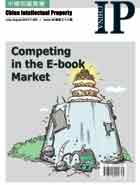This time shanzhai1 hesitated when confronted by the huge success of e-books. Shenzhen has seen many intensive e-book related exhibitions and forums, and this is much like the time when Netbook was launched. At the beginning of 2008, when Netbook hit the market, a number of exhibitions and forums about Netbook were held in Shenzhen. Today, however, this has become a nightmare to the shanzhai. On March, 16, 2010, the “World E-paper Conference and Electronic Reader Exposition 2010,” was held in Shenzhen. Well-known manufacturers in the e-book industry attended while the shanzhai manufacturers, which had received major attention, didn’t appear.
Customer is king
“I also sold e-books, but had limited orders from my clients; mainly government officers and companies, since the demand was not large and most of the need was gift-oriented,” said Mr. Wang, who has been working as a computer dealer for 4 years. “Some people asked me if shanzhai iPads were available. The answer is that none are presently available. But I don’t think it is worth it for the shanzhai to enter the e-book market. The profit from e-books is much less than that of Netbooks.” Other dealers in Zhong Guan Cun, like Mr. Wang, who learned from the experience of Netbooks, said they would not sell shanzhai e-books because of the small profits. Shanzhai products depend on quantity, but for now people are buying e-books for others as gifts. Most orders of the Hanwang e-book are from large gift orders. It is difficult to make a breakthrough in the e-book market even for a professional e-book enterprise, so it is no wonder the shanzhai makers are not to hurrying to enter the e-book market at this point.
Since e-readers haven’t garnered much attention from ordinary consumers in the end market, shanzhai producers are taking the attitude that it is best to wait for an opportunity and for e-readers to make the transformation from a promise to a market reality. No matter how popular it is in the market, the consumer response is the best touchstone. Worse still, the launch of iPad this year confused shanzhai: Whether to produce e-books or panel computers is a big problem. Therefore, shanzhai dared not produce on a large scale, but instead chose small scale production.
“The price of an iPad in China is 5400 Yuan, but only 3500 Yuan in the U.S. I heard that a shanzhai iPad is about 2000 Yuan. I wouldn’t buy a shanzhai iPad unless it was 500 Yuan. Otherwise I would rather buy a genuine iPad,” said Mr. Li, a computer aficionado. Shanzhai products attract consumers by their low prices. At one time the shanzhai iPhone sold at 50 Yuan. However, the cost of an e-book and panel computer seems difficult to bring down. The E-ink screen technology has been mastered by just a few manufactures, such as Taiwan’s Prime View International Co. Ltd., and the annual output is limited. Shanzhai can barely make the screen. The 6-inch E-ink screen is sold at more than USD 50, which is far higher than consumers’ expected price and it is hard for them to accept.
However, “if the cost can be controlled and the market matures, we can begin producing at anytime, as long as there is a model and no difficulty in technology, which is not just boasting,” expressed a shanzhai manufacturer. Getting a shanzhai e-reader on the shelf requires E-Ink technology adoption with a 5-6 inch screen, a WinCE or Linux operating system and a Samsung processor chip. The basic function of shanzhai e-readers is much the same as that of domestic manufactures, while the price of a shanzhai e-book is only about 1000 Yuan, which is more favorable.
Piracy rescues shanzhai
“Generally, e-books use the standard configuration of 4G, which means it can accommodate about 10,000 copies of a book the size of The Romance of Three Kingdoms,” said the Hanwang salesman. This is the regular model for manufactures, but the final competition will be over content. The sellers purchase the copyright of books and consumers can download books on the sellers’ websites freely or pay for it through the sellers’ channel. Though most shanzhai don’t have an optimistic attitude on e-book business, there are still some shanzhai doing it. And the key reason is the existence of pirated e-books on Internet besides the pre-installed content in shanzhai. There are still loopholes in Internet copyright, and many books can be downloaded from the Internet, worse still, Chinese consumers get used to the free consumption of culture. Consumers find it hard to say “no” to the low prices and the reading model which doesn’t require a second payment. All these factors provide an opportunity for shanzhai e-readers. But, this can not last long. Once the government cracks down the Internet piracy, the free resources will disappear, and you can not foresee the future of shanzhai e-books. This is similar with the legalization of Internet video.
Editor’s Notes:
1 According to the "Modern Chinese Dictionary" ("现代汉语词典"), "Shanzhai" can stand for two meanings:
-
A fenced place in the forest.
-
Villages in the mountain that have stockade houses.
The use of “Shanzhai” to refer to imitation products comes from
Cantonese slang in which “shanzhai factory” means an ill-equipped, low-end and family-based factory.




